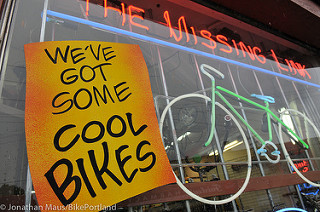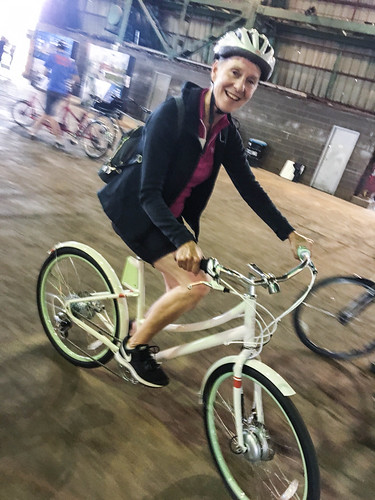Oregon’s infamous $15 bicycle excise tax goes into effect in just 20 days.
On January 1st, bicycle retailers across the state will have to be registered with the Department of Revenue (DOR) and have systems in place to collect and record the fee. To help make sure shops are ready, DOR has sent notices in the mail and has set up a website with more information.
We’ve been in touch with many Portland-based bike shops to hear how they’re feeling about it. So far we’ve heard a range of opinions. Some shop owners disagree with the tax in principle and/or have concerns about how it will impact their business, while others don’t think it’ll be that big of a deal.
As for the tax itself, the first order of business from the State’s perspective is to educate retailers. In a letter (PDF) sent to shops on December 4th, the DOR laid out the basics of the tax and offered answers to several frequently asked questions.
In order to comply with the new law, bike shops will have to collect the tax from every new bicycle sold in Oregon or on bicycles sold online to an Oregon customer. The tax must be identified on the buyer’s receipt and dealers must file a report on taxes it has collected to the DOR at the end of each quarter (first report being due April 30th, 2018). The DOR has set up an online system where shops can register and make their filings electronically.
To review, here’s when the tax applies: all new bicycles with a sale price of $200 or more, with wheels 26-inches or larger, and that are “exclusively human powered and designed for use on the ground.”
A few quirks worth knowing
One thing we got wrong in our previous reporting has to do with electric-assist bikes. Because of the “exclusively human powered” clause, e-bikes are clearly exempt from the $15 excise tax. However, another new tax passed last session called the “vehicle privilege tax” that charges auto dealers a 0.5% tax per vehicle, also applies to e-bikes. The detail we overlooked is that the 0.5% privilege tax only applies to e-bikes sold at licensed auto dealerships. That means e-bikes sold at bike shops are exempt from any new taxes. Yay for e-bikes!
Folding bikes with small wheels from brands like Brompton, Bike Friday, and Tern are also exempt. And because the law says, “wheels” (plural) must be 26-inches or larger, many long-john or “bakfiets” style cargo bikes — which have a large rear wheel and small front wheel — are also exempt.
The other part of the law that has caused confusion is how the location of a retailer impacts whether or not the tax is collected. According to the DOR, the tax applies to retail sales, “made in Oregon or online to Oregon customers.” This is good for Oregon-based bike shops who sell to out-of-state customers (something that happens more often than you think). But what about retailers from other states who sell to Oregonians? Because only Oregon-based retailers have to register and pay the tax, these purchases would be exempt. That loophole appears to give an advantage to out-of-state retailers. (We’ve got feelers out to confirm and clarify this and will update the post when we hear back).
And here’s something we didn’t know: If a shop fails to charge you the $15 when you buy a bike, it’s your responsibility as the customer to pay up directly to the state (you can do it online here).
What bike shop owners and employees say
We reached out to several Portland bike shops at the end of October to ask them about the new tax. Most of them said administration of the new tax won’t be that difficult; but that’s not the only thing on their minds…
Carrie Leonard, Islabikes (direct-to-consumer brand that specializes in children’s bikes):
“As a first consequence of the newly enacted Oregon Transportation Bill, Islabikes has lost a children’s bicycle sale. We received an email yesterday from a potential out of state customer who is not going to purchase an Islabike because he doesn’t want to support this type of legislation and he also feels the law as written should not apply to our bikes. Counter to the insistence of the legislators that this was only to tax adult riders, your local children’s bike manufacturer is both collecting the tax and losing sales. If this is the beginning of a trend, not only will we be taxing behavior we should be incentivizing, we will be penalizing Oregon-based bicycle companies. While $15 is a small percentage of the purchase price of our bikes, the impression that Oregon is taxing something that it shouldn’t is all it can take to drive consumers elsewhere.”
Advertisement
Bill Larson, Cyclepath (high-end bikes and lots of custom builds):
“Yes, we’ve heard people talking about it. There’s typically two sentiments that people speak to.. Some individuals are not concerned with paying the tax as long as it goes to something “worthwhile” or cycling related, however, they typically are of the belief that administration of said tax wont leave much left for the worthwhile part. The other typical sentiment is that they wouldn’t mind paying it as long as it wasn’t framed in the idea that cyclists dont already pay their own way. The tax to them seems punitive, for years of not contributing.”
Tommy Tuite, Tuite Bicycle Repair (small neighborhood shop):
“At the moment, Im not anti tax. But I do think who ever suggested it is a jerk. Most of my customers are not looking to spend alot on a new bicycle… Although I do carry a handful or bikes on my floor, my biggest complete bicycles are awesome single speed bikes that cost $199. My biggest concern is how the tax is intended to be spent. Bikes don’t damage roads, they improve them by being one (or more) less car. If anything, they should spend the money on bicycle safety programs, driver education and bicycle theft recovery/prevention.”
Eva Frazier, Clever Cycles (family, transportation, and cargo bikes):
“For bike sales as a whole in our shop, we can’t just universally apply the tax to “adult bicycles”, as we sell a number of folding bikes and cargo bikes that don’t fit the rule of 26″ wheel or larger. Now’s the time to buy a Brompton [a popular folding bike with 16-inch wheels]!
Talk about the tax has subsided since the buzz in the summer. I imagine it’ll get implemented, we’ll collect what we need to collect, and not a whole lot will change. The only constant is change in this world, and we’ll adapt.
I doubt that we’ll lose sales, but I think we’ll need to come up with some marketing around why the tax exists and why its a good thing. Negativity about the tax will help no one at this point.”
The Outer Rim (east of I-205 in Gateway district):
“We are salty about this whole issue! We are not prepared and it is a huge burden to set up the admin piece of this new tax. We believe we will loose a large number of sales due to our proximity to other towns where the tax does not apply. I know I would go 10 min out of the way to not pay a new useless tax.”
Mel Birge, Recumbent PDX:
“ At $15, this strikes me as silly, non-tax-revenue-producing-make-work for already overwhelmed bike retailers. Unless, that is, we’re forecasting a million bikes sold in Oregon.
I’m not opposed, on principle, to a sales tax. But, it’s strangely the third rail in chronically underfunded Oregon and, if the state imposes too much of it, all our sales go straight to Amazon. There are recumbent trike shops in California that lose business to a scummy online Utah trike operation with shipping charges a fraction of the California sales tax.
To be fair, our shop is the beneficiary of tax tourism. Folks come to our store after test riding in their local Washington or California shop. When we find out a customer made their buying decision based on a test ride elsewhere, we profit-share with that local shop (keeps us on good terms in the very small recumbent community).
Every percentage point of sales tax is exactly that much more advantage to Amazon (or the scummy Utah trike operation).”
Western Bike Works (two regional locations and large online business):
“Western Bikeworks will be paying the bike tax on behalf of our customers.”
So there you have it. A mix of feelings as we enter this new era of taxation in Oregon.
If all goes according to plan, the State claims the new tax will only cost $100,000 per year to administer while it raises $1.2 million for the existing Connect Oregon grant program (which only funds projects that are exclusively “off-highway” like paths and trails).
DOR plans to issue a press release this week to raise awareness of the new tax and to inform any bike retailers that aren’t on their mailing list. Check out the official website to register your shop and learn more.
— Jonathan Maus: (503) 706-8804, @jonathan_maus on Twitter and jonathan@bikeportland.org
Never miss a story. Sign-up for the daily BP Headlines email.
BikePortland needs your support.




